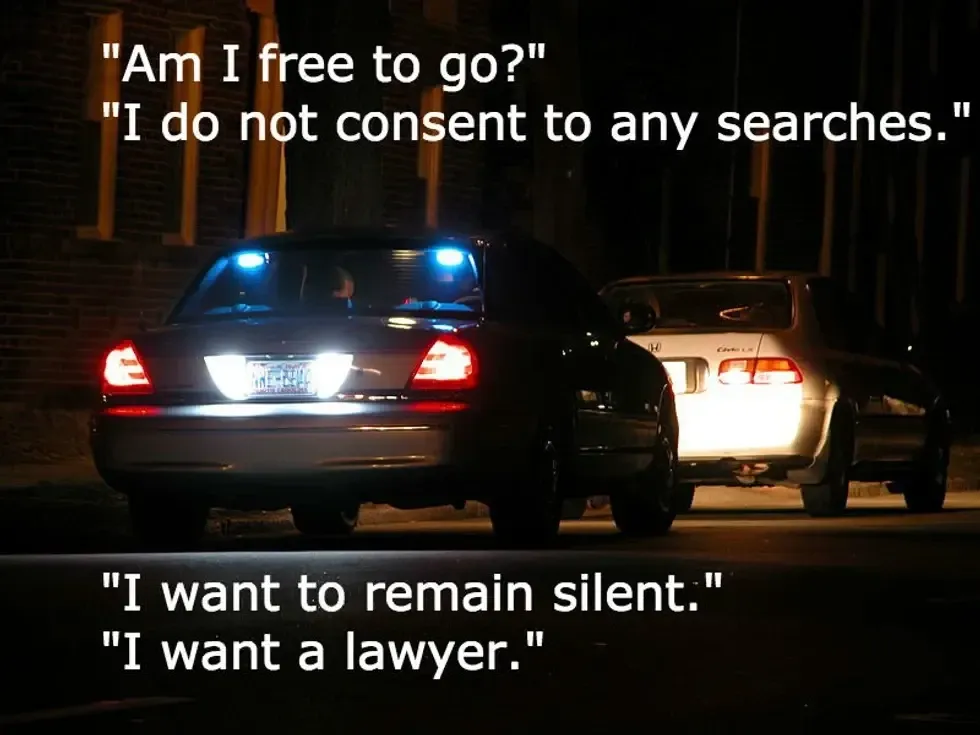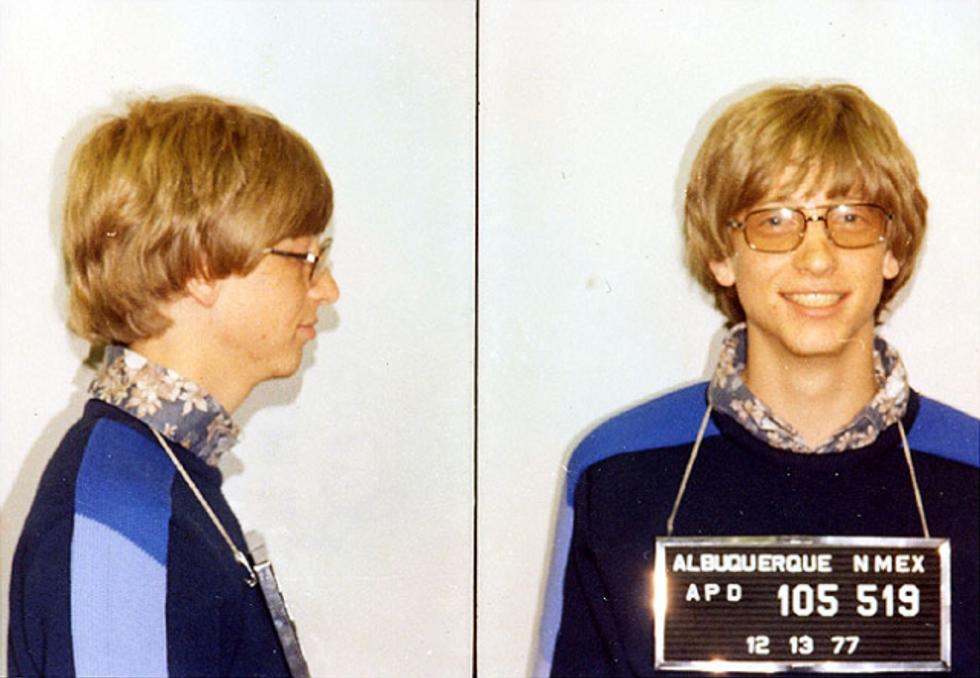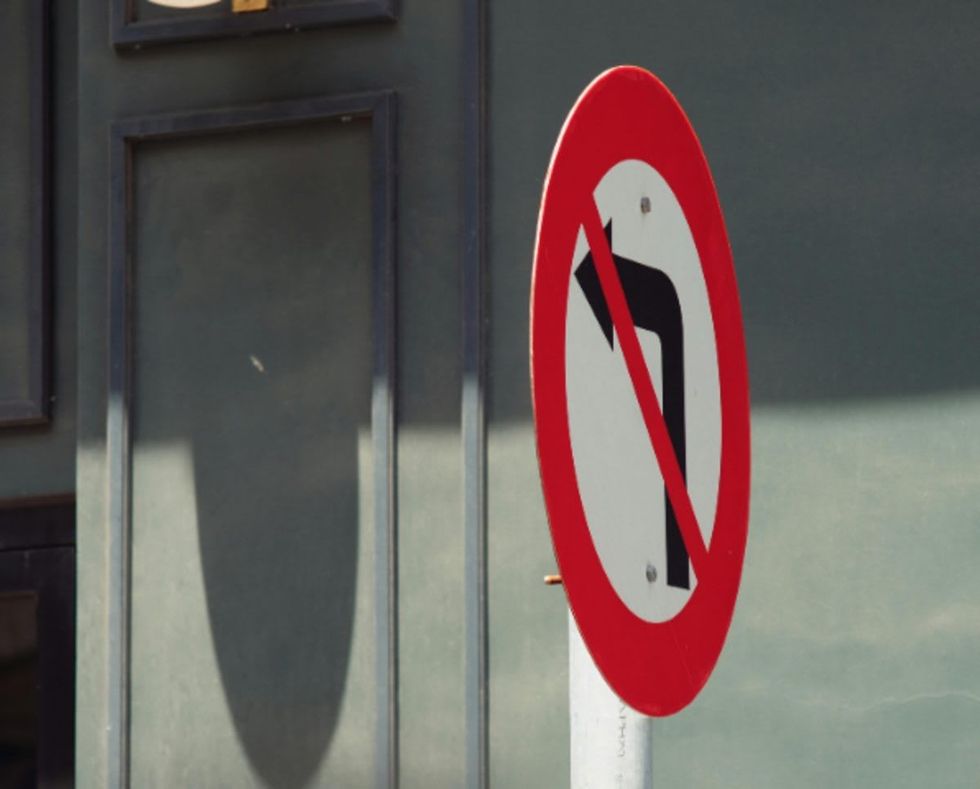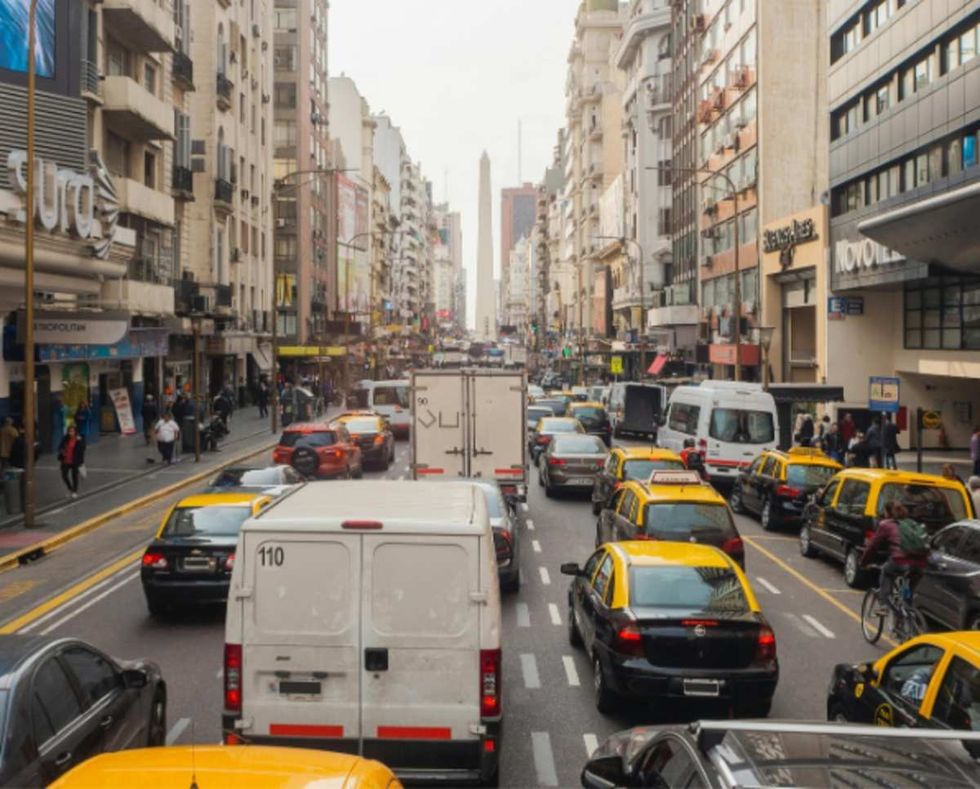Whether it's a traffic stop that turns into "We smell something in your car" or a "driving while black" situation, you have rights when you're pulled over, and it's for the best if you actually use them.
So how does this work, anyway? Well, you have rights when you're pulled over. These have been established via case law, and ultimately, some stem from the Constitution itself. In order, here are the magic phrases, along with some graphics to help you remember.
1. "Am I free to go?"
In any situation involving the police, you can ask this question. Some people ask it slightly differently: "Am I being detained?"—which is a version of the same question. Basically, if they've got nothing on you, they have to let you go. If they answer no to that question, you are in fact not free to go. In that case, you are suspected of doing something, and it's their job to try to get you to admit to it or to say a bit too much and incriminate yourself.
2. "I do not consent to any searches."
One of the trickiest things that some law enforcement folks try is to talk you into letting them search your vehicle—or house, for that matter. "So if you haven't done anything, then you're ok with us searching your car … right? I mean, if you're innocent. We'll go easier on you if you let us." Do NOT give up your rights that easily. Are you certain your buddy didn't leave a bag of weed in the glove box? Are you sure your boyfriend took his target pistol out of the trunk after he went to practice shooting the other day? Are you absolutely certain that the body in your trunk was removed and buried in that farm fiel … whoops. Did I say that last one out loud?! The point is, don't give up your rights easily. And believe me, cops are gooooood at trying to play psychological games. Which leads to #3.
3. "I want to remain silent."
You have that right, and if things start getting thick, you need to use it. "We clocked you going 60 in a 50, but when you opened your window to give us your license, we smelled marijuana." The correct answer to something like this is, "I want to remain silent." The temptation is to say, "Yeah, my buddy and I smoked in my car this morning but I wasn't driving, blah blah blah"—but then you're already nailed. Time for them to get the dogs and search. Congratulations, you're on your way to the pokey for the night.
4. "I want a lawyer."
If you've reach this particular point, then you're in deep doodoo anyway, so go ahead and ask for one, and say nothing until he or she arrives. Remember these four things. It will be hard in the moment, with your adrenaline pumping, your freedom in question, and when you're possibly in physical danger, depending on the cops involved and your skin color.
"Am I free to go?"
"I do not consent to any searches."
"I want to remain silent."
"I want a lawyer."
Perhaps a word involving the first letter of the four statements will help you remember: FoSSiL (Free, Searches, Silent, Lawyer)
Or maybe a mnemonic:
— Fiscal Suns Scramble Lives
— Fresh Sushi Smell Lemons
— Flexible Straws Sell Lobsters
— Free Subjects Steam Lobsters
And here's a graphic to help you remember.

The clip below is a shortened version of a much longer one that explains your rights, detailing what you can and cannot do in these situations. Note that the order of the above is a bit different than in the clip, but the principles are the same. Also, the idea for this article was inspired by this article on Alternet.
This article originally appeared five years ago.
Good luck out there!
This article originally appeared on 09.12.17
More on Good.is
A Police Officer Makes Profound Statement After Pulling Over A Black Teen
Whistleblower cop says teen was murdered by police as part of department 'gang' initiation
5 ways everyday citizens can start holding police departments accountable

















 2014 Toyota Corolla LED Headlight
2014 Toyota Corolla LED Headlight


 Bill Gates Swag GIF
Bill Gates Swag GIF File:Bill Gates mugshot.png - Wikipedia
File:Bill Gates mugshot.png - Wikipedia
 Representative Image Source: Pexels| Enzo Varsi
Representative Image Source: Pexels| Enzo Varsi Representative Image Source: Pexels| Markus Spiske
Representative Image Source: Pexels| Markus Spiske Representative Image Source: Pexels| Nguyen Huy
Representative Image Source: Pexels| Nguyen Huy Representative Image Source: Pexels| Ana Benet
Representative Image Source: Pexels| Ana Benet
 Representative Image Source: Pexels | Anastasia Shuraeva
Representative Image Source: Pexels | Anastasia Shuraeva Representative Image Source: Pexels | Liza Summer
Representative Image Source: Pexels | Liza Summer Representative Image Source: Pexels | Yankrukov
Representative Image Source: Pexels | Yankrukov Representative Image Source: Pexels | Shkrabaanthony
Representative Image Source: Pexels | Shkrabaanthony Image Source: TikTok |
Image Source: TikTok |  Image Source: TikTok |
Image Source: TikTok | 
 Woman standing in tree pose on edge of infinity pool (Representative Image Source: Getty Images | PhotoAlto/Sigrid Olsson)
Woman standing in tree pose on edge of infinity pool (Representative Image Source: Getty Images | PhotoAlto/Sigrid Olsson) Five adults practicing yoga, standing on one leg (Representative Image Source: Getty Images | Thomas Northcut)
Five adults practicing yoga, standing on one leg (Representative Image Source: Getty Images | Thomas Northcut) Elderly couple doing calf stretches in a park (Representative Image Source: Getty Images | RGStudio)
Elderly couple doing calf stretches in a park (Representative Image Source: Getty Images | RGStudio)